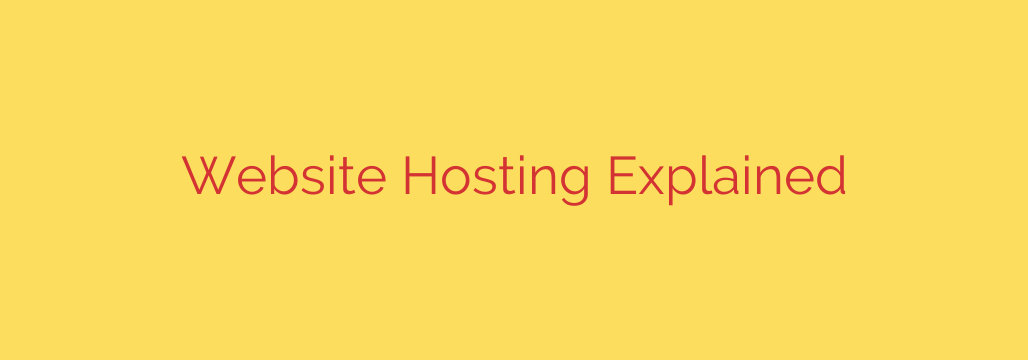
What Is Web Hosting? A Complete Guide for Beginners
Every successful website needs a strong foundation, and that foundation is web hosting. While you might focus on design and content, choosing the right hosting service is one of the most critical decisions you’ll make for your online presence. But what exactly is it, and why does it matter so much?
Think of it this way: if your domain name (like www.yourwebsite.com) is your website’s street address, then web hosting is the physical plot of land and the house where your website lives. It’s a service that provides the technology and server space needed for your website’s files—like images, text, and code—to be viewed on the internet.
Without a hosting service, your website would just be a collection of files on your computer, inaccessible to anyone else. A web host stores your site on a powerful computer called a server, making it available 24/7 to visitors around the globe.
Why Your Choice of Hosting Is So Important
Choosing a web host isn’t just a technical detail; it directly impacts your site’s performance, security, and ultimately, your success.
- Performance and Speed: No one likes a slow website. Modern internet users expect pages to load in two seconds or less. A quality host ensures fast server response times, which is crucial for keeping visitors engaged. Slow loading times lead to higher bounce rates and can negatively affect your search engine rankings.
- Security: A reliable hosting provider acts as your first line of defense against cyber threats. They manage server security, protect against malware, and often provide tools to safeguard your data. Poor hosting security can leave your website and your visitors’ information vulnerable to attacks.
- Reliability (Uptime): Uptime refers to the amount of time your website is online and accessible. The industry standard is 99.9% uptime. If your server goes down, your website goes down with it, costing you visitors, sales, and credibility.
The Main Types of Web Hosting Explained
Web hosting isn’t a one-size-fits-all solution. The type you need depends on your website’s traffic, technical requirements, and budget. Here are the four most common types.
1. Shared Hosting
Shared hosting is like renting an apartment in a large building. You share the building (the server) and its resources—like memory, processing power, and disk space—with many other tenants (websites).
- Best for: New websites, personal blogs, and small businesses with low traffic.
- Pros: It’s the most affordable and beginner-friendly option, with the hosting company handling all technical maintenance.
- Cons: Resources are shared, so a traffic spike on another site can potentially slow yours down. You have less control over the server environment.
2. VPS (Virtual Private Server) Hosting
A VPS is like owning a condo or a townhouse. You still share the main building with others, but you have your own dedicated, partitioned space with guaranteed resources.
- Best for: Websites that have outgrown shared hosting, small to medium-sized businesses, and e-commerce stores.
- Pros: You get more power, flexibility, and control than with shared hosting, without the high cost of a dedicated server. Performance is more stable and reliable.
- Cons: It requires more technical knowledge to manage and is more expensive than shared hosting.
3. Dedicated Server Hosting
Dedicated hosting is the equivalent of owning your own house. You rent an entire physical server exclusively for your website. All of its resources belong to you.
- Best for: High-traffic websites, large e-commerce stores, and businesses with specific security or performance needs.
- Pros: Offers maximum performance, security, and control. You can customize the server environment to your exact specifications.
- Cons: It is the most expensive option and requires advanced technical expertise to manage effectively.
4. Cloud Hosting
Cloud hosting is a more modern approach that uses a network of connected virtual and physical servers that work together to host a group of websites. It’s like a flexible utility—you can tap into more resources as you need them.
- Best for: Websites with fluctuating traffic, large-scale applications, and businesses that need high availability.
- Pros: Extremely reliable and scalable. If one server fails, another in the network takes over. You often only pay for the resources you actually use.
- Cons: Costs can be less predictable than fixed-price plans, and the setup can be complex for beginners.
Key Features to Look for in a Hosting Provider
When comparing hosting plans, don’t just look at the price. These features are essential for your website’s health and growth:
- Uptime Guarantee: Look for a provider that guarantees at least 99.9% uptime. Anything less is unacceptable in today’s market.
- Sufficient Storage and Bandwidth: Storage is the amount of space you have for your files, while bandwidth is the amount of data that can be transferred. Ensure the plan meets your current needs with room to grow.
- 24/7 Customer Support: When something goes wrong, you need help immediately. Choose a host with a reputation for fast, helpful, and accessible customer support via live chat, phone, or email.
- Security Features: A free SSL certificate is a must-have for encrypting data and showing visitors your site is secure (the “https” in your URL). Other features like firewalls, malware scanning, and regular backups are also critical.
- Scalability: Your hosting plan should be able to grow with your website. A good provider makes it easy to upgrade from a shared plan to a VPS or other solution as your traffic increases.
Ultimately, your web host is your partner in building an online presence. By understanding the different types of hosting and prioritizing key features like speed, security, and support, you can make an informed decision that sets your website up for long-term success.
Source: https://kifarunix.com/how-does-website-hosting-work/








